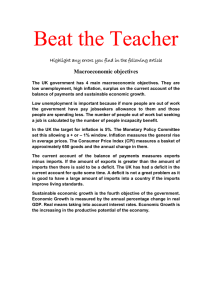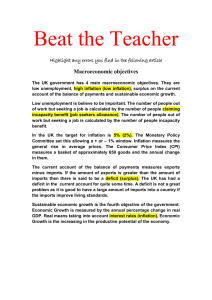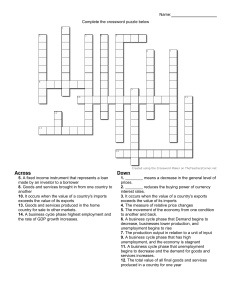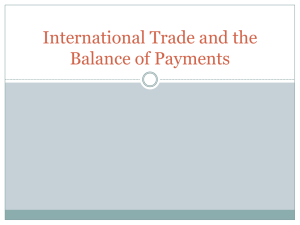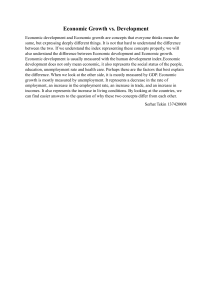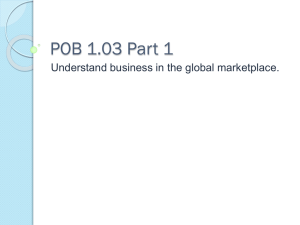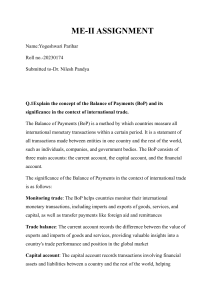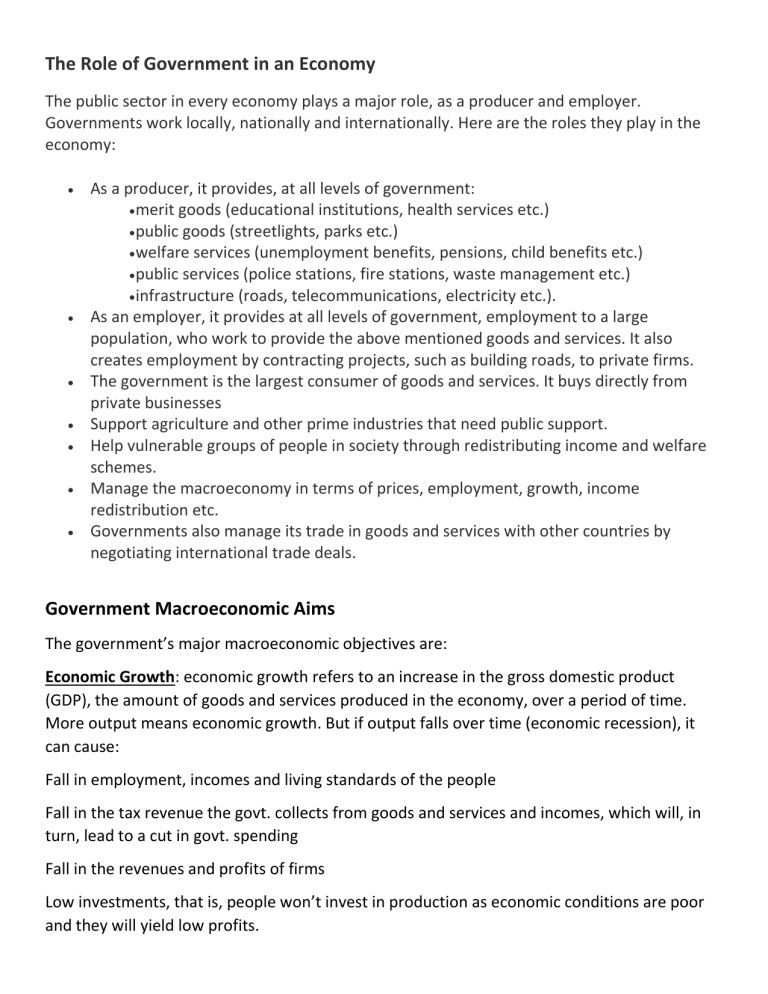
The Role of Government in an Economy The public sector in every economy plays a major role, as a producer and employer. Governments work locally, nationally and internationally. Here are the roles they play in the economy: As a producer, it provides, at all levels of government: merit goods (educational institutions, health services etc.) public goods (streetlights, parks etc.) welfare services (unemployment benefits, pensions, child benefits etc.) public services (police stations, fire stations, waste management etc.) infrastructure (roads, telecommunications, electricity etc.). As an employer, it provides at all levels of government, employment to a large population, who work to provide the above mentioned goods and services. It also creates employment by contracting projects, such as building roads, to private firms. The government is the largest consumer of goods and services. It buys directly from private businesses Support agriculture and other prime industries that need public support. Help vulnerable groups of people in society through redistributing income and welfare schemes. Manage the macroeconomy in terms of prices, employment, growth, income redistribution etc. Governments also manage its trade in goods and services with other countries by negotiating international trade deals. Government Macroeconomic Aims The government’s major macroeconomic objectives are: Economic Growth: economic growth refers to an increase in the gross domestic product (GDP), the amount of goods and services produced in the economy, over a period of time. More output means economic growth. But if output falls over time (economic recession), it can cause: Fall in employment, incomes and living standards of the people Fall in the tax revenue the govt. collects from goods and services and incomes, which will, in turn, lead to a cut in govt. spending Fall in the revenues and profits of firms Low investments, that is, people won’t invest in production as economic conditions are poor and they will yield low profits. Price Stability: inflation is the continuous rise in the average price levels in an economy during a time period. Governments usually target an inflation rate it should maintain in a year, say 3%. If prices rise too quickly it can negatively affect the economy because it: Reduces people’s purchasing powers as people will be able to buy less with the money they have now than before Causes hardship for the poor Increases business costs especially as workers will demand higher wages to support their livelihood Makes products more expensive than products of other countries with low inflation. This will make exports less competitive in the international market. Full Employment: if there is a high level of unemployment in a country, the following may happen: The total national output (goods produced) will fall Government will have to give out welfare payments (unemployment benefits) to the unemployed, increasing public expenditure while income taxes fall – causing a budget deficit Large unemployment causes public unrest and anger towards the government. Balance of Payments Stability: economies export (sell) many of their products to overseas residents, and receive income and investment from abroad; they also import (buy) goods and services from other economies, and make investments in other countries. These are recorded in a country’s Balance of Payments (BoP). Exports > Imports = Surplus in BoP Exports < Imports = Deficit in BoP All economies try to balance this inflow and outflow of international trade and payments and try to avoid any deficits because: If it exports too little and imports too much, the economy may run out of foreign currency to buy further imports A BoP deficit causes the value of its currency to fall against other foreign currencies and make imports more expensive to buy, while a BoP surplus causes its currency to rise against other foreign currencies and make its exports more expensive in the international market. Income Redistribution: to reduce the inequality of income among its citizens, the government will redistribute incomes from the rich to the poor by imposing taxes on the rich and using it to finance welfare schemes for the poor. All governments struggle with income inequality and try to solve it because: Widening inequality means higher levels of poverty Poverty and hardship restricts the economy from reaching its maximum productive capacity. Conflict of macroeconomic aims: Full Employment v/s Price Stability Low rates of unemployment will boost incomes of businesses and workers. This rise in incomes, mean higher demand and consumption in the economy, which causes firms to raise their prices – resulting in inflation. This is probably the most prominent policy conflict in the study of Economics. Economic Growth & Full Employment v/s BoP Stability Once again, as incomes rise due to economic growth and low unemployment, people will import more foreign products and consume relatively less domestic products. This will cause a rise in imports relative to exports and a deficit may arise in the balance of payments. Economic Growth v/s Full Employment In the long run, when economic growth is continuous, firms may start investing in more capital (machinery/equipment). More capital-intensive production will make a lot of people unemployed.
